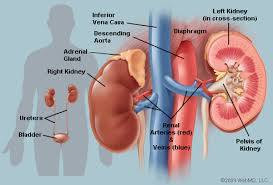How does intense physical activity affect kidney function?
Intense physical activity is a crucial aspect of maintaining a healthy lifestyle, but it can also have implications for kidney function. In this article, we delve into the relationship between intense physical activity and kidney health, exploring both the potential benefits and risks associated with vigorous exercise.
Understanding Kidney Function
Before delving into the effects of intense physical activity on the kidneys, it's essential to understand the role of these vital organs in the body. The kidneys play a crucial role in filtering waste products and excess fluids from the blood, regulating blood pressure, and producing hormones that help control red blood cell production and calcium metabolism. Factors such as hydration, diet, and overall health can significantly impact kidney function.
Effects of Intense Physical Activity on Kidney Function
Intense physical activity can exert stress on the body, including the kidneys. One of the primary concerns associated with vigorous exercise is dehydration. When the body loses more fluids than it takes in, the kidneys have to work harder to maintain proper fluid balance. Dehydration can impair kidney function and increase the risk of kidney injury, particularly in individuals who engage in prolonged or strenuous exercise without adequate hydration.
Furthermore, the breakdown of muscle tissue during intense physical activity can lead to the release of proteins and other waste products into the bloodstream, placing additional strain on the kidneys. While the kidneys are generally resilient and can adapt to short-term increases in workload, chronic dehydration or overexertion can compromise their ability to function effectively over time.
Benefits of Physical Activity on Kidney Function
Despite the potential risks, regular physical activity can offer numerous benefits for kidney health. Exercise helps improve cardiovascular health, lower blood pressure, and control weight, all of which are essential factors in reducing the risk of kidney disease. Additionally, physical activity can help manage risk factors such as diabetes and hypertension, which are leading causes of kidney damage.
Precautions for Individuals with Kidney Concerns
Individuals with pre-existing kidney conditions or concerns should take precautions when engaging in intense physical activity. It’s crucial to monitor hydration levels closely and ensure adequate fluid intake before, during, and after exercise. Consulting healthcare professionals, such as nephrologists or sports medicine specialists, can provide personalized recommendations and guidance based on individual health needs.
Hiranandani Hospital Powai News: Addressing Kidney Care
Hiranandani Hospital Powai News is at the forefront of providing comprehensive Hiranandani Hospital Kidney Care services. From state-of-the-art diagnostic facilities to advanced treatment options, the hospital offers a multidisciplinary approach to managing kidney-related issues. Regular check-ups and screenings are essential for early detection and intervention, ensuring optimal kidney health and overall well-being.
Conclusion
In conclusion, intense physical activity can have both positive and negative effects on kidney function. While dehydration and increased risk of injury are concerns, regular exercise plays a crucial role in maintaining overall health and reducing the risk of chronic kidney disease. By staying hydrated, monitoring hydration levels, and seeking medical guidance when needed, individuals can safely enjoy the benefits of physical activity while safeguarding their kidney health.
FAQs
1. Is intense physical activity safe for individuals with kidney disease?
It’s essential for individuals with kidney disease to consult their healthcare provider before engaging in intense physical activity. Depending on the severity of the condition, certain modifications may be necessary to ensure safety.
2. How can I stay hydrated during intense exercise sessions?
Drinking water before, during, and after exercise is crucial for maintaining hydration levels. Additionally, consuming electrolyte-rich beverages or sports drinks can help replenish lost fluids and minerals.
3. Are there specific types of exercise that are better for kidney health?
Aerobic exercises such as walking, swimming, and cycling are generally considered safe and beneficial for kidney health. However, it’s essential to listen to your body and avoid activities that cause discomfort or excessive strain.
4. Can intense physical activity cause kidney damage in otherwise healthy individuals?
While rare, extreme exertion, especially in hot and humid conditions, can lead to a condition known as exertional rhabdomyolysis, which can cause kidney damage. It’s crucial to gradually increase the intensity of exercise and prioritize proper hydration and recovery.
5. How often should I undergo kidney screenings?
The frequency of kidney screenings depends on individual risk factors and health history. It’s advisable to discuss screening recommendations with a healthcare provider, who can provide personalized guidance based on your specific needs and circumstances.



Comments
Post a Comment